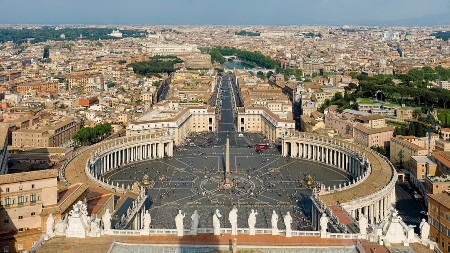We ask you, urgently: don’t scroll past this
Dear readers, Catholic Online was de-platformed by Shopify for our pro-life beliefs. They shut down our Catholic Online, Catholic Online School, Prayer Candles, and Catholic Online Learning Resources—essential faith tools serving over 1.4 million students and millions of families worldwide. Our founders, now in their 70's, just gave their entire life savings to protect this mission. But fewer than 2% of readers donate. If everyone gave just $5, the cost of a coffee, we could rebuild stronger and keep Catholic education free for all. Stand with us in faith. Thank you.Help Now >
Pope: Bible to be interpreted with the magisterium
FREE Catholic Classes
Vatican II presented the principles of correct exegesis which must be carried out within the context of Tradition.
Highlights
VATICAN CITY (AsiaNews) - In regard to the Bible - Old and New Testament - scholarly study of the texts is not sufficient, it must be interpreted within the tradition of the Church, since both are equally inspired by the Holy Spirit.
This affirmation was made most recently by Vatican II, and is especially dear to Benedict XVI, who today reiterated "that the Catholic exegete does not harbor the individualistic illusion that the biblical texts can be understood better outside of the community of believers. The contrary is true, because these texts were not given to individual researchers 'to satisfy their curiosity or to provide them with material for study and research' (Divino Afflante Spiritu, EB 566). The texts inspired by God have been entrusted to the community of believers, to the Church of Christ, in order to nourish faith and guide the life of charity."
Receiving the members of the Pontifical Biblical Commission today, the pope spoke about the inspiration and truth of the Bible, which was the topic of the commission's meeting. "This is a very important topic, because it concerns not only the believer, but also the Church itself, because the life and mission of the Church are necessarily founded on the Word of God, which is the soul of theology, and, at the same time, the inspiration of all Christian existence."
Benedict XVI recalled that Leo XIII, Pius XII, and Vatican II reiterated in a variety of ways that "Holy mother Church, relying on the belief of the Apostles, holds that the books of both the Old and New Testaments in their entirety, with all their parts, are sacred and canonical because written under the inspiration of the Holy Spirit, they have God as their author and have been handed on as such to the Church herself" (Dei Verbum, 11).
This correct approach to the concept of the divine inspiration and truth of Holy Scripture leads to norms that directly concern its interpretation. "In this regard," the pope recalled, "Vatican Council II indicates three criteria that are always valid for an interpretation of Sacred Scripture in keeping with the Spirit who inspired it. First of all, one must pay great attention to the content and unity of all the Scripture. In fact, as different as the books making it up may be, Sacred Scripture is one by virtue of the unity of God's plan, of which Jesus Christ is the center and heart (cf. Lk. 24:25-27; Lk. 24:44-46).
"In the second place, one must read Scripture in the context of the living tradition of the whole Church. According to a saying of the Fathers, "Sacra Scriptura principalius est in corde Ecclesiae quam in materialibus instrumentis scripta," "Sacred Scripture is written in the heart of the Church before it is written on material instruments." In fact, the Church carries within its Tradition the living memory of the Word of God, and it is the Holy Spirit who gives it the interpretation of this, according to its spiritual meaning (cf. Origen, Homiliae in Leviticum, 5,5). As the third criterion, it is necessary to pay attention to the analogy of faith, or to the cohesion of the individual truths of faith among one another and with the overall plan of Revelation and the fullness of the divine economy contained within it."
The task of researchers studying the Sacred Scripture by various means, then,"is that of contributing according to the aforementioned principles to a deeper understanding and exposition of the meaning of Sacred Scripture. Scientific study of the sacred texts is not sufficient by itself. In order to respect the coherence of the faith of the Church, the Catholic exegete must be attentive to viewing the Word of God in these texts from the perspective of the Church's faith.
In the absence of this indispensable point of reference, exegetical research remains incomplete, losing sight of its main purpose, with the danger of becoming a sort of mere intellectual exercise. The interpretation of the sacred Scriptures cannot be only an individual scientific effort, but must always be situated, inserted, and authenticated by the living tradition of the Church. This norm is decisive for clarifying the correct and reciprocal relationship between exegesis and the Magisterium of the Church.
"The texts inspired by God have been entrusted to the community of believers, to the Church of Christ, in order to nourish faith and guide the life of charity. Respect for this purpose influences the validity and efficacy of Biblical hermeneutics. The encyclical Providentissimus Deus recalled this fundamental truth, and observed that, far from obstructing Biblical research, respect for this fact fosters its authentic progress."
In conclusion, "only the ecclesial context permits sacred Scripture to be understood as the authentic Word of God, the guide, norm, and rule for the life of the Church and the spiritual growth of believers. This involves the rejection of any interpretation that is subjective for simply limited to analysis alone, which is incapable of containing the overall meaning that over the course of the centuries has guided the Tradition of the entire people of God."
Join the Movement
When you sign up below, you don't just join an email list - you're joining an entire movement for Free world class Catholic education.

-

-
Mysteries of the Rosary
-
St. Faustina Kowalska
-
Litany of the Blessed Virgin Mary
-
Saint of the Day for Wednesday, Oct 4th, 2023
-
Popular Saints
-
St. Francis of Assisi
-
Bible
-
Female / Women Saints
-
7 Morning Prayers you need to get your day started with God
-
Litany of the Blessed Virgin Mary
Daily Catholic
 Daily Readings for Thursday, January 16, 2025
Daily Readings for Thursday, January 16, 2025 St. Fursey: Saint of the Day for Thursday, January 16, 2025
St. Fursey: Saint of the Day for Thursday, January 16, 2025 Prayer for a Blessing on the New Year: Prayer of the Day for Tuesday, December 31, 2024
Prayer for a Blessing on the New Year: Prayer of the Day for Tuesday, December 31, 2024- Daily Readings for Wednesday, January 15, 2025
- St. Paul the Hermit: Saint of the Day for Wednesday, January 15, 2025
- St. Theresa of the Child Jesus: Prayer of the Day for Monday, December 30, 2024
![]()
Copyright 2024 Catholic Online. All materials contained on this site, whether written, audible or visual are the exclusive property of Catholic Online and are protected under U.S. and International copyright laws, © Copyright 2024 Catholic Online. Any unauthorized use, without prior written consent of Catholic Online is strictly forbidden and prohibited.
Catholic Online is a Project of Your Catholic Voice Foundation, a Not-for-Profit Corporation. Your Catholic Voice Foundation has been granted a recognition of tax exemption under Section 501(c)(3) of the Internal Revenue Code. Federal Tax Identification Number: 81-0596847. Your gift is tax-deductible as allowed by law.







 Daily Readings for Thursday, January 16, 2025
Daily Readings for Thursday, January 16, 2025 St. Fursey: Saint of the Day for Thursday, January 16, 2025
St. Fursey: Saint of the Day for Thursday, January 16, 2025 Prayer for a Blessing on the New Year: Prayer of the Day for Tuesday, December 31, 2024
Prayer for a Blessing on the New Year: Prayer of the Day for Tuesday, December 31, 2024

